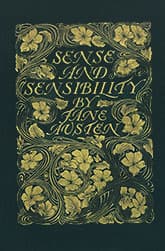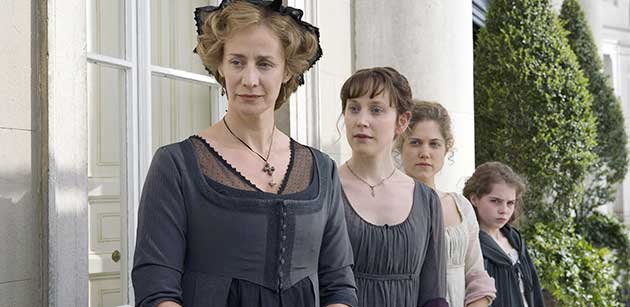Sense and Sensibility
Critique • Quotes • At the movies
 1899 edition
1899 editionFirst publication
1811
Literature form
Novel
Genres
Literary, romance
Writing language
English
Author's country
England
Length
Approx. 119,500 words

Mrs. Dashwood and her three daughters in the 2008 miniseries of Sense and Sensibility.
Sense and sensuality on the home screen
Sense and Sensibility (2008): Television miniseries, 174 minutes; director John Alexander; writer Andrew Davies; featuring Hattie Morahan, Charity Wakefield, David Morrissey, Dan Stevens, Dominic Cooper, Janet McTeer, Mark Williams, Mark Gatiss, Lucy Boynton
Television shows of three episodes often seem best suited for adapting classic novels. Longer series, especially as they get up to eight or more episodes, may better cover the detailed plots and complex characters of the original works, but they risk boring us. When we watch a film or video, do we really want to replicate the drawn-out experience of reading those massive old tomes? Don't we prefer in the visual medium to be moved and entertained by the books' highlights
As for one-shot movie treatments—well, they can work, but the extreme compression to get a whole complex text into a couple of hours often distorts the original story.
So the 2008 remake of Sense and Sensibility, totalling about three hours spread over three segments, is close to ideal. It successfully balances faithfulness to the book for Austen readers with enticements for general viewers.
This is the BBC's third series based on the book, after productions in 1971 and 1981 that still have their supporters, and the stellar and acclaimed 1995 movie treatment.
So why another adaptation? Partly because there's an insatiable appetite for anything Jane Austen. Partly because writer Andrew Davies and the filmmakers were challenged to surpass the earlier movie, despite its great popularity.
In some ways they succeeded. The longer running time let them include more of the book's secondary scenes and add some new material, all to appeal to a new youthful audience.
Davies, known for scripting numerous classics including the Pride and Prejudice series of 1995 and Bleak House in 2005, is said to have "sexed up" Sense and Sensibility—though this is a misleading description of what he's done here. A brief, out-of-focus seduction scene is shown before the titles of the first episode and Edward Ferrars (Dan Stevens) is shown chopping wood in the rain with his shirt sticking to his body, supposedly reminiscent of Colin Firth as Darcy emerging from the water in Pride and Prejudice. And—warning to delicate viewers—there's some kissing in this film! So sensual rather than sexy. Let's say, an appreciation of the physical in the lives of the characters whose lives sometimes seem wrapped up in intellectual, emotional and financial concerns.
Brief television trailer for the 2008 BBC production of Sense and Sensibility.
Also the production is visually lush, showing sumptuous decor in the gentry's homes (Norland is more like a palace than a country mansion), lavish landscapes and seascapes, and, for the first time, a truly ramshackle "cottage" the Dashwood women end up roughing it in—with their two servants.
The success of any Sense and Sensibility depends largely on the five actors who play the two elder sisters and their three suitors. And they all carry it well.
The two elder sisters are played as nineteen and seventeen years old, as in Austen's novel. The previously little-known Hattie Morahan at first seems bland in the role of Elinor but she grows in likability to the point that it's hard to look away from her in any scene. One grows to feel for the repressive Elinor more than usual.
Marianne is also winningly played by a relative newcomer, Charity Wakefield. In her romantic delusions the character can come across as whiny, petulant and annoying, but here we can understand what her admirers—good and bad—see in her. We can follow her maturation as she and Elinor, very different personalities, grow grow more like each other.
But about those good and bad men. As excellent as the actors are, the trouble is the two supposedly dull men are more attractive and more interesting, than the supposedly dashing figure of the scoundrel Willoughby (Dominic Cooper). David Morrissey, the most accomplished of the leads, may be the strongest Colonel Brandon ever. This goes some way to explaining how Marianne could finally fall in love with him. And Stevens's Edward is adorable, even without that wood-chopping scene, as well as self-confident and personable.
Another scene added to the story is a sword fight in which Brandon beats Edward but lets him live. I'm not sure that this, like the opening seduction scene, really adds anything, It seems an arbitrary attempt to inject some lively action into a generally sedate story and further enhance Brandon's image.
Otherwise, the 2008 production hits all the key scenes from Austen's first novel, while fleshing out the characters and narratives in small ways to render it more appealing for a young audience. A Sense and Sensibility for the new millennium.
— Eric

